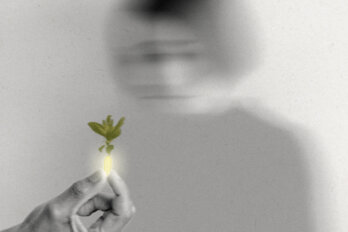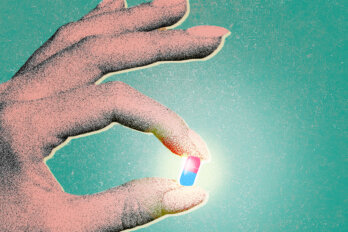Listen to an audio version of this story
For more audio from The Walrus, subscribe to AMI-audio podcasts on iTunes.
Last May, when the COVID-19 vaccine finally became available for my age group in Ontario, I could barely get a shot in my arm fast enough. I scoured my region for pop-up clinics and set up phone alerts for every tweet from Vaccine Hunters as well as my regional public health department. I was so desperate to be protected as soon as possible that, in the end, I lined up with my sister at 9:30 p.m. in a pharmacy that just happened to have gotten a shipment of Pfizer that day. The pharmacist blasted ’90s house music and pretended to stab my sister in the arm as I snapped a photo.
A month later, I was so eager for my second dose that I chose Moderna solely because I could get it a week earlier than a second dose of Pfizer. Meanwhile, my husband happily accepted an AstraZeneca / Moderna cocktail. Whatever it took. No hesitation.
But I have much higher safety standards for my five-year-old son than for myself. I still cut his hot dogs and grapes lengthwise to prevent choking, and I’m so paranoid of accidentally locking him in the car that I always make sure he has both feet on the ground before I shut my own door. So I will get him vaccinated, but not with the same exuberance I had lining up at a Shoppers Drug Mart past my bedtime. And I’m not sure if it’s because the stakes seem higher with my own child or if I’m just so thoroughly, soul-crushingly exhausted from the past year and a half of pandemic parenting that everything seems harder than it really is.
Last month, I found myself in a hospital room holding my son down as he cried, “No, no, no,” and tried to hide his face in my shirt so the doctor couldn’t swab his nose. He’s now had four COVID-19 tests. I’ve also had to help hold my screaming nineteen-month-old down for two tests. Neither of them has had COVID-19, but they do get runny noses and fevers, and each time, I have to subject them to a painful test just so they can get back to school and daycare so my husband and I can get back to work.
Each time one of my children needs a test, I torture myself over every decision I made that led us to that hospital room. Should I have let my sons go to school and to their playgroup? Should I have let them hug their grandparents? What made them sick? How can I ensure this doesn’t happen again without causing them to miss out on more of their childhoods?
Every day, Canadian parents ask themselves these questions while weighing the risks of sending their unvaccinated children out into a largely vaccinated but still infectious world. At the start of the pandemic, we were told that our kids played a major role in spreading the virus to more vulnerable populations but weren’t seriously affected by it themselves. Now, as every age range in Canada except the youngest has access to a COVID-19 vaccine, it’s our kids who are vulnerable, and child cases are on the rise.
However, this could soon change. In mid-October, Pfizer officially asked Health Canada to approve its vaccine for kids ages five to eleven. Some experts predict that Canada could start the rollout in November. But will parents excitedly rush to get their kids vaccinated the same way many did for themselves? Or is this final risk-versus-reward choice—one that has the potential to dictate the course of our kids’ childhoods—the burden that will finally break us?
I have a group of three mom friends with kids the same ages as mine. We’ve all struggled with our mental health, lost entire weeks of work with kids home waiting for COVID-19 test results, cried over our lack of support, debated the risks of socially distant grandparent visits, felt utter despair over how we could keep doing this every day with no end in sight, and then woken up every morning to do it all again.
When I recently asked the group how they feel about getting their kids vaccinated, their answers surprised me. One of my friends said she would get her daughter vaccinated and couldn’t understand why anyone wouldn’t. But the other two said they felt more cautious and couldn’t put their fingers on why. One friend said it just felt different with her own child. The other went on an impassioned (but not incorrect) monologue about how abandoned parents and kids have been this entire pandemic and how tired she is from trying to keep her children safe. All four of us are fully vaccinated.
Most parents already get routine immunizations for their children. In Ontario, for instance, unless they have a valid reason for exemption, children must be vaccinated against a whole host of diseases in order to attend school. So why does the COVID-19 vaccine feel different for so many?
Many parents can’t wait to get their younger children vaccinated and feel guilty that they’re protected while their kids remain vulnerable, says Michelle Barton, the division chief of infectious diseases at the Children’s Hospital in London, Ontario, and a member of the Canadian Paediatric Society’s Infectious Diseases and Immunization Committee. “Some say it makes them feel they placed more value on their own lives than on their children,” she says. “It’s a helpless feeling that they are not able to protect the ones they would want to die for.”
But others—even those who have had the shot themselves—are trepidatious. Just half of 5,011 parents surveyed in a new poll by the Angus Reid Institute said they plan to vaccinate their five-to-eleven-year-old children as soon as a vaccine becomes available. Nearly 20 percent said they would do it eventually but not right away, and 23 percent said they would not vaccinate their kids.
The most common questions parents tend to have are about the development of the vaccine and potential side effects, says Julia Orkin, a pediatrician at The Hospital for Sick Children, in Toronto, and the medical lead on the hospital’s COVID-19 outreach program, which includes vaccination and testing. “The vast majority of the calls are easily answered through education.”
Pfizer and BioNTech have tested a pediatric dose of their mRNA vaccine one-third the size of an adult’s dose. Participants received ten micrograms in two shots given three weeks apart. In those ages five to eleven, the vaccine was safe, well tolerated, and showed “robust neutralizing antibody responses,” Pfizer said in a press release at the end of September. The results are currently under review by Health Canada. Moderna has also released preliminary results on its COVID-19 vaccine for children in the six-to-eleven age range, though it’s not yet under review here.
Since children can’t be expected to make fully informed decisions on whether to be vaccinated, their parents are left to navigate the risks. Experts assure us that, despite concerns about the speed of vaccine development, they’re safe. And, while side effects are possible, severe side effects tend to be rare. These considerations must be taken to heart with the knowledge that kids can still develop long COVID-19 or the rare but very dangerous complication that causes multiorgan inflammation.
Debating the risks versus the rewards of our choices is so ingrained in parenting that I’m not even sure we realize how much of our time and energy is devoted to the matter. Swaddling, bed sharing, crossing the street, riding a bike, playing at a friend’s house, and getting in a car all carry risks too, but we weigh the pros and cons and decide what is best for our children. It starts before they’re born, it’s exhausting, and I’m not sure it ever ends.
Maybe parents are hesitant because this one particular decision weighs extra heavily after so many months of high-stakes pandemic negotiations on top of a lifetime of daily nonpandemic risk assessments. A recent survey from the American Psychological Association bears this out: nearly one in three Americans surveyed said pandemic stress was impeding their ability to make even basic decisions. That number rose to 47 percent for parents.
The risk-versus-reward analysis of vaccinating children against COVID-19 seems to yield a clear result: it will help protect them and help protect others who are vulnerable to the virus, which is why I will vaccinate my son. But the science isn’t all that weighs on my mind. So much of my son’s childhood could ride on this shot, and what might seem trivial to those who don’t have children is a crucial part of my decision. Whom he’s allowed to play with, his ability to attend his ninja gymnastics class and take swimming lessons, and his long-standing wish to eat a Happy Meal inside a McDonald’s could soon be dictated by his vaccination status.
For mass vaccination to be effective, parents also have to trust one another to make a decision that affects the health of kids other than their own. And that’s not easy for either side. How many times (prepandemic) did I give my kid Advil and sneak him into daycare with a low-grade fever because I couldn’t possibly take another day off work? But, when one of my son’s classmates coughed as he was saying goodbye to his mom at drop-off last week, I went into a tailspin.
When we went into our first lockdown, my husband and I told our eldest son, who was then three and a half, that he couldn’t go to daycare or the park because of “special germs.” We’ve taught our children about hand washing, masking, and social distancing, just as we’ve taught them how to tie their shoes and why leaves change colour in the fall. And, from morning to night, we make decisions: three-ply PAW Patrol mask that’s loose around the ears or two-ply rainbow mask that fits him better? Screen time after school or play outside in the cold? Tell him Grandpa had a runny nose yesterday so can’t visit this weekend after all or risk needing another COVID-19 test to avoid the disappointment?
My son grew out of “special germs” by the time he was four and started referring to the pandemic as “corona-birus.” Now, at five, he’s old enough to call it what it is, “COVID,” and he’s stopped asking when things will go back to normal.
I’m hopeful, however, that the next time I have to hold my son in a medical facility, it will be for a quick jab of a COVID-19 vaccine. And I’m hopeful that other parents will do the same so we can find our way out of this pandemic sooner rather than later.
I’ve been making hard choices and weighing risks for him since the day I found out I was pregnant and switched to decaf (and then switched back a few months later, after my doctor assured me one cup of coffee per day was safe). I remember crying uncontrollably that first night I sat up holding my baby, wondering how I could possibly find the strength to protect him every single day. And that was in a pre-COVID-19 world.
But I woke up the next morning, and every morning after that, to do it all over again. Because, when it comes to keeping our children safe, we don’t really have a choice.





